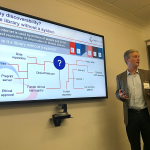This week, we learn about the world’s largest open access agreement between Elsevier and UK academic institutions, a new platform that aims to improve academic book metadata, and a new training programme for open peer reviewers in Africa. We also hear about FAIR data at the California Digital Library and about how the COVID-19 pandemic has impacted the use of open access academic books. Finally, we share an upcoming webinar about diamond open access publishing.
To read:
Jisc and Elsevier sign world’s largest open access agreement via Research Information | 2-minute read
In the biggest open access news of the week, publishing giant Elsevier has signed a 3-year open access agreement with Jisc, the negotiating body representing UK academic research institutions. The agreement, which is the largest agreement of its kind globally, will give authors at UK institutions unlimited and immediate open access to Elsevier’s 2700 journals, as well as immediate open access publishing. Jisc’s Managing Director of Higher Education and Research Liam Earney said that the agreement is “unique both in the level of savings and the access it delivers”.
Metadata made simple with BookMetaHub via ScienceOpen | 3-minute read
This week sees the launch of ScienceOpen’s latest development, BookMetaHub. This is an online platform that publishers can use to create and enhance the metadata associated with their online academic book content. It is hoped that the platform will help standardize communication between various indexing systems and their respective data formats, will improve the discoverability and accessibility of book content, and will simplify content management for open access and traditional publishers alike. The platform is currently still in the beta phase, and ScienceOpen are seeking new users to test it out.
Open peer reviewer training offered in Africa via Research Professional News | 1-minute read
African researchers interested in open science can be nominated for a free workshop to train open peer reviewers, tailored to the African context. The training will consist of four online sessions throughout April and is aimed at trainees in the life sciences and medicine. It will follow a ‘train-the-trainer’ format, through which attendees will be empowered to train their own colleagues in their respective scholarly communities. The workshop is funded by Wellcome and has been developed through a collaboration between preprint server AfricArXiv, research mentorship programme Eider Africa, open science non-profit eLife, open peer review trainer PREreview and communication training centre TCC Africa.
To listen to:
FAIR data at the California Digital Library via FAIR Data Podcast | 35-minute listen
In this episode of the FAIR Data Podcast, host Rory MacNeil talks to John Chodacki (Director of the University of California Curation Center at California Digital Library) about how John got involved in data, the role of altruism in growing the FAIR (findable, accessible, interoperable and reusable) data movement, ethical and governance issues, and future challenges and opportunities surrounding FAIR data.
To watch:
How the pandemic accelerated the need for open access via Open Research Community | 40-minute watch
In this webinar, Mirela Roncevic (Director of Library Relations at Knowledge Unlatched) discusses how the COVID-19 pandemic has accelerated the need for open access publishing. The use of open publications, including open access scholarly books, skyrocketed as a result of the pandemic, with researchers and librarians around the world taking advantage of open access hosting platforms and services like the Open Research Library and OAPEN. Mirela also discusses how to best use open access resources to continue supporting open research.
To engage with:
Webinar: what impact will diamond open access have on research? via Academia Europaea Cardiff
Diamond open access, in which authors are not charged fees to publish open access, has been proposed as an alternative to the gold open access model. In this 1-hour webinar, a panel of experts in open access publishing will discuss what diamond open access means for researchers, research institutions, learned societies, libraries and publishers. The event is a collaboration between Academia Europaea Cardiff, KU Leuven Libraries and the Young Academy of Europe. Register for free here.
Have you listened to our podcast with Inspiring STEM Consulting about driving positive change in the communication of pharma-sponsored research? Listen to it for free here, along with the rest of the series – featuring how open access saves lives, accelerates discovery and promotes global equity.






